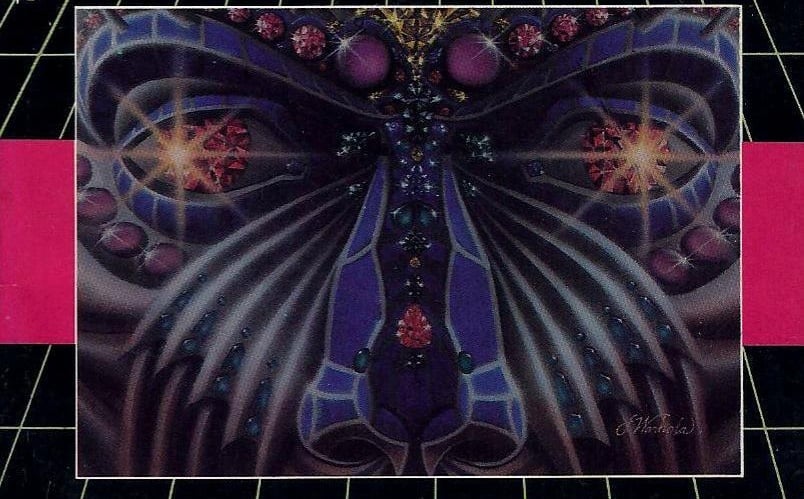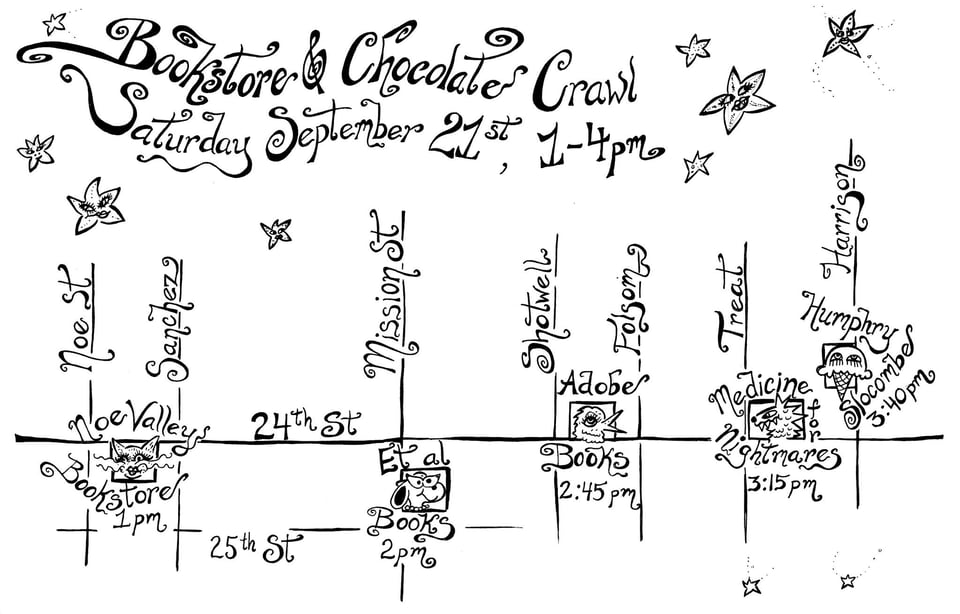
We spend a lot of time discussing how genres work, where to draw the lines between genres, and which tropes and motifs are essential to a particular genre. But I haven't seen as much chatter about where genres come from and why they exist. If anything, I usually see people saying things like, "Genres are marketing categories.” Which is true, as far as it goes — except that it doesn't address why those marketing categories matter, or why they're so effective. So here's my working theory for why genres exist in the first place.
Basically, somebody reads a book and really likes it. And then they want to read more books like that one, so they go looking for books that are similar to the one they just enjoyed.
Maybe that book was Lord of the Rings, in which case they want more epic fantasies featuring quests, plucky heroes, and elaborate worldbuilding. Maybe that book was Dune or Foundation, in which case they might go in search of complicated politics in outer space. Maybe it was Neuromancer, in which case they're gonna crave cyberpunk. See also: Harry Potter (ugh), Twilight, Hunger Games, Fourth Wing. Y’all get the idea. There's usually one book or one series that tons of people embrace, and it leads them to track down other books that have similar characteristics — not just tropes, but also style and ethos.
So yes, genres are marketing categories — but they usually work because because they address a real demand on the part of readers, who really liked something and are hungry for more of it. (This is an important distinction, because a lot of the time marketing is about getting people interested in something that they might not care about as much, like one brand of soap over another.)
If you accept the notion that most genres have one (or a few) foundational texts, whose extreme popularity fueled demand for more of the same, then the question of what belongs in a genre really comes down to how much “the same” it needs to be.
I did some research on the history of epic fantasy for an episode of Our Opinions Are Correct, and the received wisdom seems to be that at first, authors stuck pretty closely to the template laid down by Tolkien. Lester Del Rey started publishing other epic fantasy novels in 1977, and the earliest ones were somewhat closely modeled on Middle-Earth. (Again, we talk about this a lot in our podcast episode, I’m summarizing.)
Over time, it seems like epic fantasy diversified in style, subject matter, and the sort of people whose work was centered in it. At this point, an epic fantasy no longer needs to feature a quest, a band of adventurers, or many of the other elements that mostly defined post-Tolkien high fantasy. What remains is a propensity towards maps, some notion of huge sweeping events that may or may not involve a war, the fate of kingdoms… and a hefty page count.
My sense is that a lot of genre labeling and identification comes down to vibes, or know it when you see it, much like porn.
Nobody read The Hunger Games and thought, “I need to read more books about a teenage girl who fights with a bow and arrow and eventually wears a pin with a bird on it.” Nobody even came away craving more teen death sports. What many people who loved that book wanted — myself very much included — was more of that feeling we got from it. Speaking for myself, I was dying to read more YA books that had that level of disdain for entrenched hierarchy, the state use of violence to crush resistance and placate/entertain a complacent population, and an entertainment industrial complex that all too often dehumanizes people in the pursuit of pandering.
In fact, I'd argue that a genre only really becomes healthy when it outgrows its foundational text and starts appealing to the spirit, rather than the letter, of its influences. Another example: after George R.R. Martin’s Westeros books hit big, I read some grimdark fantasies that felt like they were trying to recapture that same magic — but I’ve gotten more of the feeling I got from A Clash of Kings by reading fantasy books that share few of the same plot devices but have a similar respect for the characters and showing the consequences of their choices.
So when I approach a genre, or a particular work that I'm influenced by, I try to think about why I love it, and how it made me feel — rather than the specific elements I could lift from it. (Of course, those two things often blur together quite a bit.)
In the case of my YA space-opera trilogy, I thought a lot about why I love space opera, both on the page and on screen. I especially thought about space battles — not because I felt like something can't be a proper space opera without pew-pew-pew, but because I really, really love a good space battle. I love cool tactics, taunting speeches over view-screens, ambushes, and one commander trying to get inside the head of another.
At one point I went on Twitter (RIP) and asked people about their favorite space battles, and what made them so good. The answers predictably involved Wrath of Khan, BSG, and Galaxy Quest, but also a few others I didn't expect. I worked really hard to make every battle in my trilogy pull its own weight narratively and feel like a real turning point in the story — but also made sure it was as cool as I possibly could make it and as different as possible from the other ones in the trilogy.
That trilogy is instructive in a different way, though. In earlier drafts of Victories Greater Than Death, I struggled a bit to balance the Star Trek framework of a captain and experienced officers with young-adult fiction’s expectation that teens will be on their own with no adult supervision. I knew the obvious thing was to have a group of teenagers steal a starship and go off on an adventure alone — basically like the first season of Star Trek: Prodigy, which didn’t exist yet. But I wasn’t so interested in that, for various reasons. Nor did I want to magically give my protagonist Tina all of the experience of a seasoned captain right off the bat, which absolutely was on the table with the premise I had set up — because I felt like that made her less interesting as a teen protagonist.
In the end, Victories Greater Than Death plays with the tension between those two modes, the Star Trek story and the teen adventure. That let me kind of play up Tina’s identity crisis, and her struggles over whether she needs to murder people in order to be a galactic hero. Plus I got seriously attached to Yatto the Monntha, a former movie star turned officer.
The second and third books of the trilogy lean much harder in the direction of “teens on their own” and away from the Lower Decks-type thing of having my teen characters be cadets/ensigns on board a ship full of older officers. This partly came from listening to the characters, at least half of whom were not interested in joining the Royal Fleet after their first adventure. But I also feel as though ironically getting further away from the direct influence of Star Trek in the second and third books helped me come closer to capturing the spirit of what I love about Star Trek.
I don't think I'm alone in caring more about the feelings that a book gave me than about the specific widgets it used to conjure those feelings — in fact, I would imagine I'm not the first to say any of this. We do live in an era where people are more highly aware of specific tropes they like or don't like, thanks to things like TV, tropes and archive archive of our own among other things, but I still get a strong sense that it's about the feelings those tropes evoke rather than simply having that trope be present.
In other words, I think genre labels are immensely useful, but we should all remember they’re mostly vibes and feels, rather than a set of prescriptions.
Music I Love Right Now
I was gonna write about some recent album releases by the incredible Billy Porter — next week! — but then Frankie Beverly died. I never got to see Maze Featuring Frankie Beverly in concert, despite going to a million “old-school R&B superstars” concerts back in the day, and I’m sad I never got to hear that incredible voice in person. I’ve been listening to tons of Maze since I read the news, and he really was a unique talent. One of my favorite Maze/Frankie Beverly songs is a somewhat obscure song from The Brothers soundtrack, “Teach Each Other.”


It just hits hard, and like so many of his songs, the lyrics are deep as hell.
I also love “Too Many Games,” one of many songs about how relationships can go wrong because people stop listening to each other. And “Nobody Knows How You Feel Inside.” You’ve probably heard “Before I Let Go,” especially since Beyoncé covered it so beautifully. His whole back catalog is total gold.
My Stuff
I’m helping to organize two events next week! Please show up! I don’t want to have to eat all the chocolate and drink all the drinks by myself.
This Saturday starting at 1 PM is the Bookstore and Chocolate Crawl (Facebook link). We visit bookstores all along 24th street and eat some chocolate along the way. It starts at the new Noe Valley Bookstore, in the old Folio Books space. At 2 PM, we’ll have readings and music at Et Al. Gallery/Bookstore on Mission and 24th. Here’s a map with the times we’ll be in other places, thanks to Poppers the Pony:

On Tues Sept. 24 at 7 PM, Writers With Drinks is back (FB link) for Banned Books Week! Featuring readings by Susan Stryker, Tara Sim, Kemi Ashing-Giwa, Annalee Newitz, Maia Kobabe and Jaime Cortez. That’s at Strut, 470 Castro St. It’s free but donations to Strut/Magnet are appreciated.
Here’s a pre-order link for Lessons in Magic and Disaster, my first novel for adults since 2019. A young witch teaches her mother magic, while also discovering the queer secrets behind a mysterious novel from 1749. It’s a sweet, hopefully fun novel that touches on grief and trauma.
You can get signed/personalized copies of all my other books from Green Apple Books — they ship all over!
This was issue #162 of Happy Dancing. You can subscribe, unsubscribe, or view this email online.
This email brought to you by Buttondown, the easiest way to start and grow your newsletter.